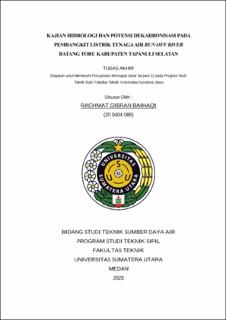Kajian Hidrologi Dan Potensi Dekarbonisasi Pada Pembangkit Listrik Tenaga Air Run Off River Batang Toru Kabupaten Tapanuli Selatan
Hydrological Study and Decarbonization Potential of the Run off the River Hydroelectric Power Plant on the Batang Toru River, South Tapanuli Regency

Date
2025Author
Baihaqi, Rachmat Gibran
Advisor(s)
Sembiring, Robi Arianta
Metadata
Show full item recordAbstract
Indonesia has abundant water resource potential for the utilization of
Hydroelectric Power Plant (HEPP). The Batang Toru River has a hydropower
potential of 510 MW, which has not yet been maximized. The research problem
focuses on hydrological analysis to determine the reliable discharge and electricity
generation capacity of the Batang Toru HEPP. The main objective of this research
is to analyze the hydrological potential of the river, calculate the electricity
generation capacity that can be produced, and evaluate the total carbon gas
emissions from energy generation, supporting the sustainable and environmentally
friendly operation of the HEPP. The research method involves a literature study,
collection of historical rainfall and river discharge data, and hydrological analysis
to determine the reliable discharge. Hydraulic analysis is conducted to calculate
the effective head and head loss. Furthermore, energy generation capacity
simulations are performed, accompanied by a general environmental impact
analysis to provide mitigation recommendations.
Based on the analysis, the Batang Toru HEPP requires reliable discharge
for sustainable operation. The 90% reliable discharge (Q90) of 72,67 m³/second
does not meet the 510 MW requirement, making reservoir construction necessary.
With a design discharge of 219.494 m³/second, 510 MW can be generated.
Additionally, this HEPP can reduce CO2 emissions by 1,326,645 tons per year and
is entitled to a CER fund of Rp. 244,054,986,345. It is also recommended to expand
the hydrological data coverage and utilize modern technologies such as GIS-based
modeling for more in-depth analysis. Moreover, feasibility analysis of the HEPP,
as well as environmental and social impacts on local communities, should be
conducted. The research should also focus on greenhouse gas emission reduction
technologies to enhance energy generation efficiency.
Collections
- Undergraduate Theses [1625]
